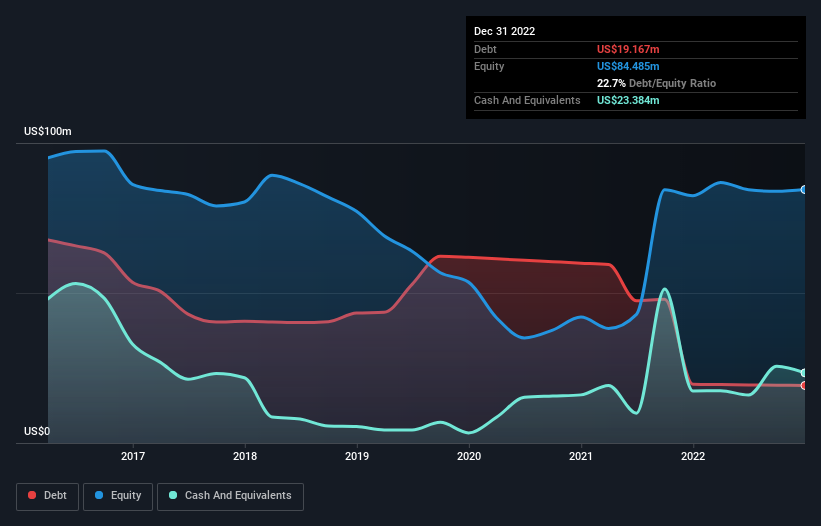- United States
- /
- Healthcare Services
- /
- NasdaqGS:PHLT
Is Performant Financial (NASDAQ:PFMT) Weighed On By Its Debt Load?
The external fund manager backed by Berkshire Hathaway's Charlie Munger, Li Lu, makes no bones about it when he says 'The biggest investment risk is not the volatility of prices, but whether you will suffer a permanent loss of capital.' It's only natural to consider a company's balance sheet when you examine how risky it is, since debt is often involved when a business collapses. As with many other companies Performant Financial Corporation (NASDAQ:PFMT) makes use of debt. But is this debt a concern to shareholders?
When Is Debt Dangerous?
Debt assists a business until the business has trouble paying it off, either with new capital or with free cash flow. Ultimately, if the company can't fulfill its legal obligations to repay debt, shareholders could walk away with nothing. However, a more frequent (but still costly) occurrence is where a company must issue shares at bargain-basement prices, permanently diluting shareholders, just to shore up its balance sheet. Of course, plenty of companies use debt to fund growth, without any negative consequences. When we examine debt levels, we first consider both cash and debt levels, together.
Check out our latest analysis for Performant Financial
What Is Performant Financial's Net Debt?
As you can see below, Performant Financial had US$19.2m of debt, at December 2022, which is about the same as the year before. You can click the chart for greater detail. However, it does have US$23.4m in cash offsetting this, leading to net cash of US$4.22m.

How Strong Is Performant Financial's Balance Sheet?
Zooming in on the latest balance sheet data, we can see that Performant Financial had liabilities of US$14.2m due within 12 months and liabilities of US$20.1m due beyond that. On the other hand, it had cash of US$23.4m and US$30.4m worth of receivables due within a year. So it can boast US$19.4m more liquid assets than total liabilities.
This surplus suggests that Performant Financial has a conservative balance sheet, and could probably eliminate its debt without much difficulty. Simply put, the fact that Performant Financial has more cash than debt is arguably a good indication that it can manage its debt safely. There's no doubt that we learn most about debt from the balance sheet. But it is future earnings, more than anything, that will determine Performant Financial's ability to maintain a healthy balance sheet going forward. So if you want to see what the professionals think, you might find this free report on analyst profit forecasts to be interesting.
In the last year Performant Financial had a loss before interest and tax, and actually shrunk its revenue by 12%, to US$109m. We would much prefer see growth.
So How Risky Is Performant Financial?
By their very nature companies that are losing money are more risky than those with a long history of profitability. And in the last year Performant Financial had an earnings before interest and tax (EBIT) loss, truth be told. Indeed, in that time it burnt through US$6.5m of cash and made a loss of US$6.5m. With only US$4.22m on the balance sheet, it would appear that its going to need to raise capital again soon. Overall, its balance sheet doesn't seem overly risky, at the moment, but we're always cautious until we see the positive free cash flow. There's no doubt that we learn most about debt from the balance sheet. However, not all investment risk resides within the balance sheet - far from it. To that end, you should be aware of the 1 warning sign we've spotted with Performant Financial .
Of course, if you're the type of investor who prefers buying stocks without the burden of debt, then don't hesitate to discover our exclusive list of net cash growth stocks, today.
New: Manage All Your Stock Portfolios in One Place
We've created the ultimate portfolio companion for stock investors, and it's free.
• Connect an unlimited number of Portfolios and see your total in one currency
• Be alerted to new Warning Signs or Risks via email or mobile
• Track the Fair Value of your stocks
Have feedback on this article? Concerned about the content? Get in touch with us directly. Alternatively, email editorial-team (at) simplywallst.com.
This article by Simply Wall St is general in nature. We provide commentary based on historical data and analyst forecasts only using an unbiased methodology and our articles are not intended to be financial advice. It does not constitute a recommendation to buy or sell any stock, and does not take account of your objectives, or your financial situation. We aim to bring you long-term focused analysis driven by fundamental data. Note that our analysis may not factor in the latest price-sensitive company announcements or qualitative material. Simply Wall St has no position in any stocks mentioned.
About NasdaqGS:PHLT
Performant Healthcare
Provides audit, recovery, and analytics services in the United States.
Excellent balance sheet with moderate growth potential.
Similar Companies
Market Insights
Community Narratives


Recently Updated Narratives

Astor Enerji will surge with a fair value of $140.43 in the next 3 years

Proximus: The State-Backed Backup Plan with 7% Gross Yield and 15% Currency Upside.


A case for for IMPACT Silver Corp (TSXV:IPT) to reach USD $4.52 (CAD $6.16) in 2026 (23 bagger in 1 year) and USD $5.76 (CAD $7.89) by 2030
Popular Narratives


MicroVision will explode future revenue by 380.37% with a vision towards success


The company that turned a verb into a global necessity and basically runs the modern internet, digital ads, smartphones, maps, and AI.



